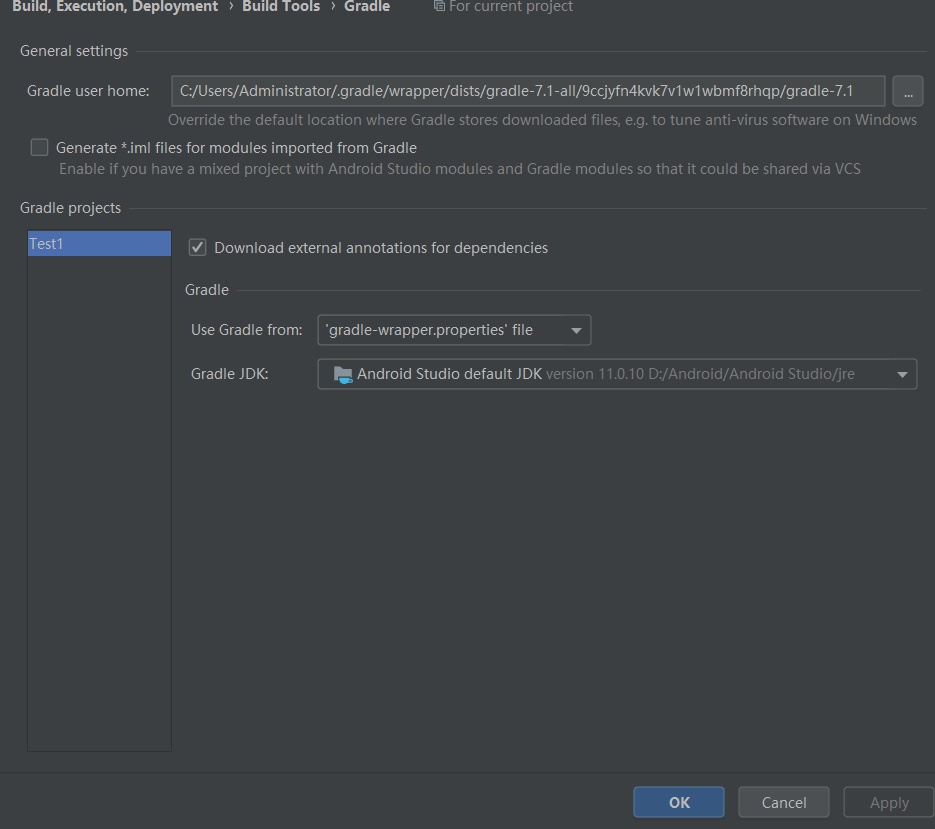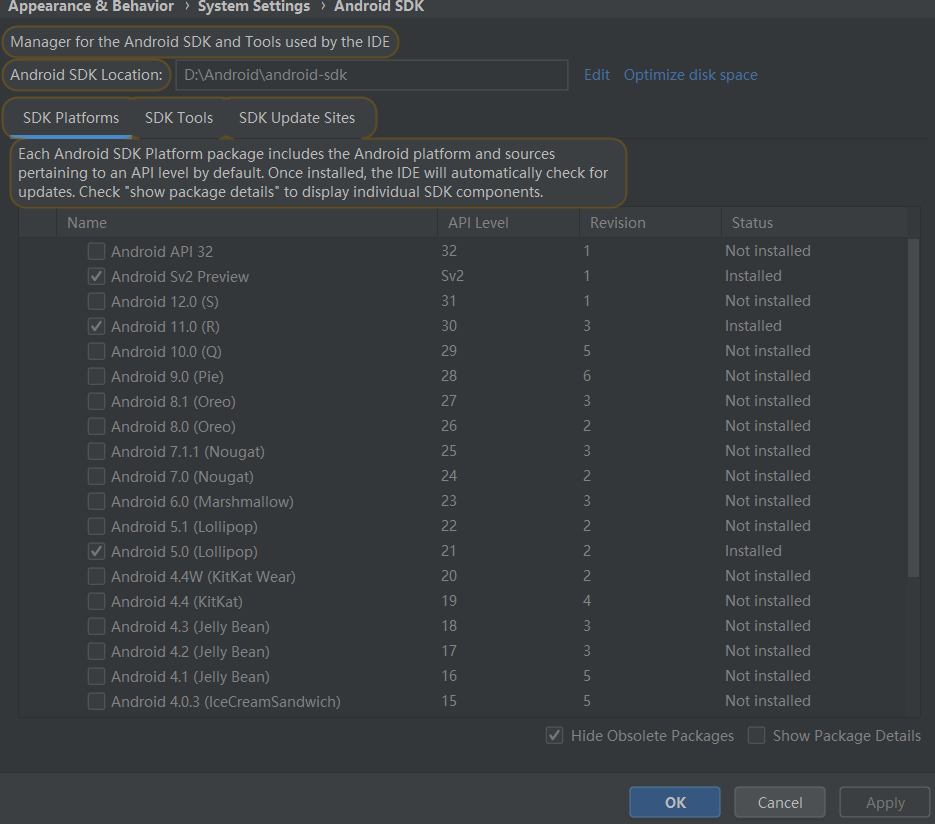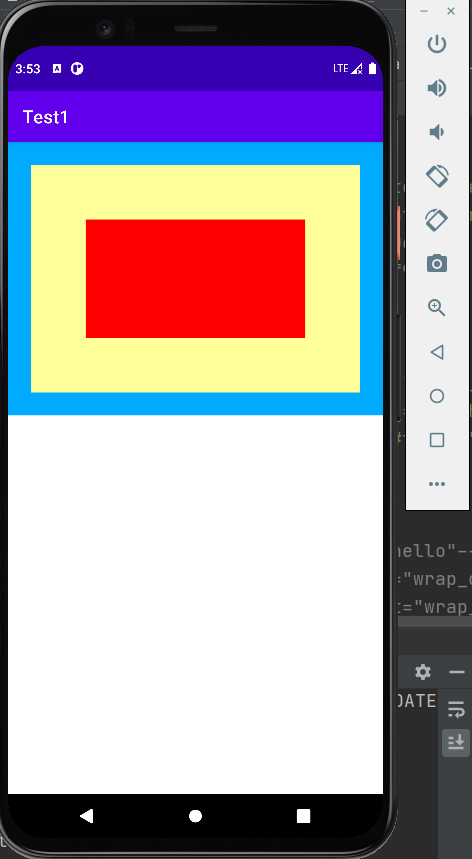目前学习用Android Studio进行android手机开发,出现了各种问题,出现问题后,搜索百度,有的一个问题,各种答案,通过多次试错排查,终于总结出了一套可以完全使用的方法了。具体的步骤如下:
1. 首先下载最新安装版Android Studio Arctic Fox,安装好后,会下载SDK,由于"墙"的存在,致使容易出现下载缓慢或者根本无法下载的问题,这时就需要进行设置了,看百度上多是设置proxy,但是这种方法,也不太可靠,我试了很多代理服务器都失效了,最后才找到一种目前看来较为稳妥的方法,就是使用http://ping.chinaz.com/ ,来ping谷歌服务器,看其中最短时间的网址,并加入hosts文件中,hosts文件地址:C:\WINDOWS\System32\drivers\etc\hosts,如

2. 在Android Studio中,新建hello world工程
3. 修改配置文件
修改gradle-wrapper.properties文件,android studio采用gradle来编译,而gradle从外围难以访问,所以可以从https://services.gradle.org/distributions/中下载gradle-7.1-all.zip到本地如C:/Users/Administrator/.gradle/wrapper/dists/gradle-7.1-all/9ccjyfn4kvk7v1w1wbmf8rhqp/gradle-7.1-all.zip,
其中9ccjyfn4kvk7v1w1wbmf8rhqp是系统自动生成的
并且在setting的Build Tools下的Gradle设置为下图所示:

distriutionUrl项改为
distributionUrl=file:///C:/Users/Administrator/.gradle/wrapper/dists/gradle-7.1-all/9ccjyfn4kvk7v1w1wbmf8rhqp/gradle-7.1-all.zip
4.build.grale模块级的设置为
plugins { id 'com.android.application' } android { compileSdk 30 defaultConfig { applicationId "com.example.test1" minSdk 21 targetSdk 30 versionCode 1 versionName "1.0" testInstrumentationRunner "androidx.test.runner.AndroidJUnitRunner" } buildTypes { release { minifyEnabled false proguardFiles getDefaultProguardFile('proguard-android-optimize.txt'), 'proguard-rules.pro' } } // compileOptions { // sourceCompatibility JavaVersion.VERSION_1_8 // targetCompatibility JavaVersion.VERSION_1_8 // } } dependencies { implementation 'androidx.appcompat:appcompat:1.2.0' implementation 'com.google.android.material:material:1.3.0' implementation 'androidx.constraintlayout:constraintlayout:2.0.4' testImplementation 'junit:junit:4.+' androidTestImplementation 'androidx.test.ext:junit:1.1.2' androidTestImplementation 'androidx.test.espresso:espresso-core:3.3.0' }
其中的compileOptions一定要去掉,因为compileSdk设置为30,所以在SDK中也应下载API为30版本的,并且要制定SDK的路径,如:

5. build.gradle工程级的设置为:
使用阿里云
buildscript { repositories { google() //mavenCentral() maven{ url 'https://maven.aliyun.com/nexus/content/groups/public/'} } dependencies { classpath 'com.android.tools.build:gradle:4.2.0' // NOTE: Do not place your application dependencies here; they belong // in the individual module build.gradle files } } allprojects { repositories { google() //mavenCentral() maven{ url 'https://maven.aliyun.com/nexus/content/groups/public/'} } }
6.在settings.gradle(Project Settings)中去掉前面的设置,改为
//dependencyResolutionManagement { // repositoriesMode.set(RepositoriesMode.FAIL_ON_PROJECT_REPOS) // repositories { // google() // mavenCentral() // jcenter() // Warning: this repository is going to shut down soon // } //} rootProject.name = "Test1" include ':app'
7.所有这设置后,就应该可以编译和调试android程序了
如果使用模拟器调试,需要BIOS打开VT-X支持,并在SDK TOOL中下载HAXM,然后调试。
笔者参照网上的例子。activity_main.xml:
<?xml version="1.0" encoding="utf-8"?> <androidx.constraintlayout.widget.ConstraintLayout xmlns:android="http://schemas.android.com/apk/res/android" xmlns:app="http://schemas.android.com/apk/res-auto" xmlns:tools="http://schemas.android.com/tools" android:layout_width="match_parent" android:layout_height="300dp" android:background="#00aaff" android:orientation="vertical" android:padding="5dp"> <LinearLayout android:layout_width="match_parent" android:layout_height="match_parent" android:layout_margin="20dp" android:background="#ffff99" android:padding="60dp"> <View android:layout_width="match_parent" android:layout_height="match_parent" android:background="#ff0000" /> </LinearLayout> </androidx.constraintlayout.widget.ConstraintLayout>
运行后,手机模拟器效果:





